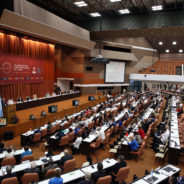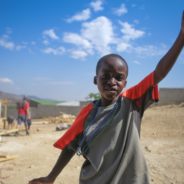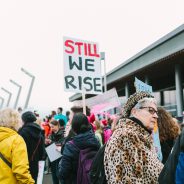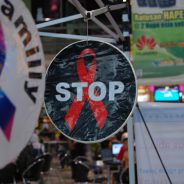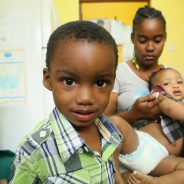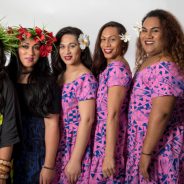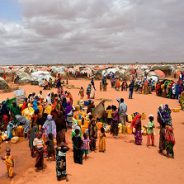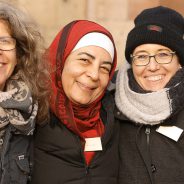The 107th Session of the International Labour Conference has Begun
The 107th Session on the International Labour Conference is taking place in Geneva, Switzerland from 28 May – 8 June.
The Conference is an annual gathering of ILO member States, who are represented by government, employer and worker delegates. The Conference (also often called an international parliament of labour) has several main tasks and objectives, including drafting and adopting international labour Conventions and Recommendations; supervising the implementation of international labour standards at the national level by going over member States’ reports; assessing Global Reports on the four fundamental rights including freedom of association and elimination of forced work; and openly discussing topical issues related to labour around the world.
Visit the Conference page for more information, including:
- The Conference agenda
- News and multimedia
- Reports submitted to the 107th Session of the International Labour Conference
- Live interviews and more.
Photo by chuttersnap via Unsplash
Apply Now for a Social Protection Summer Course at Bonn-Rhein-Sieg
The Bonn-Rhein-Sieg University of Applied Sciences is holding a short course on social protection during the summer and fall of 2018. The course consists of two weeks of distance learning from 16-27 July and one face-to-face week in Sankt Augustin from 5-12 September.
Participants are able to choose between seven course topics taught by international experts:
- Climate Change
- Health
- Migration
- Old Age
- Return to work
- Vulnerability
- Implementation of Cash Transfer Programmes
Course instructors will be from Maastricht University, the University of Witwatersrand, HelpAge, IDS and more.
To learn more and to register, visit the course page.
Photo by Crew on Unsplash
ECLAC 2018 is in Session
The 37th Session of the Economic Commission for Latin America and the Caribbean (ECLAC) is taking place from 7 – 11 May in Havana, Cuba.
The event, which takes place biennially, is the most important intergovernmental conference for steering the work of ECLAC. It serves as a forum to discuss critical economic and social development issues in the region, and is also an occasion for member States to review the Commission work.
At the 2018 session, ECLAC will present its 2016-2017 progress report and member States will contribute to defining the mandates that will guide the Commission’s work in the future.
ECLAC will also present The Inefficiency of Inequality, its new report which highlights the need for governments and other stakeholders to stop and reverse inequality in Latin America and the Caribbean. The report draws out specific themes, including what it calls a “culture of privilege” and a need to shift towards a culture of human rights.
Learn more by visiting the 37th Session’s website where you can find background documents including the agenda, reports for previous ECLAC Sessions and news.
Photo by ECLAC
ESCAP Launches New Online platform on Social Protection and Two New E-Learning Guides
The United Nations Economic and Social Commission for Asia and the Pacific (ESCAP) just launched an updated Social Protection Toolbox and e-learning guides Why We Need Social Protection and How to Build Inclusive Social Protection Systems.
The new Social Protection Toolbox is packed full of content to support policy makers and other stakeholders in Asia and the Pacific to build inclusive social protection schemes, with:
- Over 100 good practices from around the world which demonstrate how to build inclusive legal frameworks, schemes for those in poverty and persons with disabilities, and universal schemes.
- E-learning guides developed in collaboration with Development Pathways, and which show how investing in inclusive social protection can accelerate progress towards the SDGs, why universal schemes are better at reaching the poor than targeted schemes, and which policy options to consider when designing inclusive schemes. Download Why We Need Social Protection and How to Build Inclusive Social Protection Systems.
- An interactive assessment tool that will help practitioners identify coverage gaps and learn how to close them based on steps other countries are taking to fill similar gaps.
- An short animation that illustrates social protection is and why it is important for Asia and the Pacific.
- A quiz that tests your knowledge and reveals thought-provoking facts about social protection in Asia and the Pacific.
- ESCAP’s latest publications, covering a variety of topics related to social protection, poverty and inequality.
Despite significant extension of social protection coverage in Asia and the Pacific, some 60 percent of all women, men and children in the region are excluded from adequate social protection. Increasing coverage across the region would yield strong positive results in reducing stunting, malnutrition and child and maternal mortality, increase life expectancy, bolster economic growth and most importantly, reduce poverty.
Explore the Toolbox, read the press release and find out more about ESCAP’s work on social protection.
Photo credit: Andrew Neel via Unsplash.
ECLAC Hosted a Social Protection Short Course
On 5 and 6 March, ECLAC hosted an international course on social protection in Port-au-Prince, Haiti, in collaboration with USAID, the Haitian Ministry of Labour and Social Affairs, and Care.
The course’s main objective was to build capacity among government officials and provide them with knowledge on a human rights-based approach to social protection, provide them with the tools to create a more equal society, and extend social protection coverage throughout the entire life cycle in Latin America and the Caribbean.
In recent years, social protection has been increasingly recognized as being crucial to guaranteeing a basic minimum standard of living for all, and building more equitable and inclusive societies. Social protection is fundamental to contributing to the full realization of the economic and social rights, and to accelerate progress towards internationally agreed development goals, including the SDGs.
The presentations are available for download on the course website (link in French).
Photo credit: Tim Trad via Unsplash.
UNAIDS is Hosting a Conference on Social Protection and Ending AIDS
UNAIDS will host its 2018 International Conference on Fast-Tracking Social Protection to End AIDS on 25 and 26 April.
This event, hosted by UNAIDS’ Inter-Agency Task Team, brings together researchers, policy makers, civil society organizations and practitioners to discuss how a human rights-based approach to social protection is essential to ending AIDS. This year’s event aims to:
- Strengthen the links with social protection including Universal Health Care and other movements for ending poverty and inequality towards ending HIV including undertaking HIV and social protection assessments.
- Intensify actions on social protection in line with the UNAIDS strategy, the 2016 Political Declaration and Fast-Track Commitments.
- Re-invigorate programming of HIV, food security and nutrition.
The event will take place at the UNAIDS Office in Geneva in the Kofi Annan Conference Room.
Download the conference agenda, concept note and logistics information to learn more.
Click here to register by 6 April 2018.
Photo by Will O via Unsplash.
New ESCWA report: Strengthening Social Protection for Persons with Disabilities in Arab Countries
The Economic and Social Commission for Western Asia (ESCWA), recently released a new report, Strengthening Social Protection for Persons with Disabilities in Arab Countries. According to the most recent data collected by ESCWA, the disability prevalence rate in the Arab region is around 2.9 percent. This number is expected to steadily rise due to the ageing of the regional population and the fact that older persons are more likely to experience disability, as well as several recent and ongoing armed conflicts in the region. As with other regions, persons with disabilities (PWDs) in Arab countries are disproportionately poor and vulnerable. It is therefore critical that they have access to adequate social protection, which as ESCWA’s report shows is too frequently not the case.
The employment rate among persons – and especially women – with disabilities in the Arab region is very low, typically resulting in their exclusion from contributory social and health insurance (which is contingent on formal employment). In addition, the data indicate that even when PWDs work, they are more likely than others to do so informally.
Non-contributory forms of social protection – including social assistance and non-contributory health insurance –are increasingly distributed in Arab countries through poverty targeting, often by proxy means testing. While this has the potential to ensure that resources are more effectively channelled to the poor and vulnerable, the specific costs faced by PWDs, for example, special means of transport, are frequently overlooked by the targeting formulas. Thus, their real poverty level risks are underestimated, resulting in their exclusion from non-contributory social protection programmes. The extent to which this has been taken into account appears to vary between countries.
Furthermore, within both contributory and non-contributory social protection schemes in the region, benefits specifically related to disability are commonly contingent upon inability to work. This could reinforce the notion that having a disability is incompatible with participating in the labour market, so PWDs may have to choose between receiving the support they need and employment. At the same time, even when social protection is available to PWDs, it is often inadequate. Cash benefits are usually too low to compensate for disability-related costs. Additionally, the quality of health care is generally low in the region, and the particular forms of care needed by persons with disabilities are not provided.
The report stresses that social protection for PWDs must be an integrated part of sustainable development, which is based on the principle of leaving no one behind. The 2030 Agenda and the Sustainable Development Goals (SDGs) and Targets are all interdependent, meaning that advancing PWDs’ enjoyment of the right to social protection is contingent on achieving other Goals. For example, in practice, they may be able to reach health care facilities only if public infrastructure and transport are made accessible. The report also highlights the ways in which harnessing the abilities and ensuring the participation of PWDs can benefit all, and is crucial to the realization of the 2030 Agenda and the SDGs.
Down the report on ESCWA’s website.
An Arabic version will be made available shortly.
Photo by Emre Gencer via Unsplash.
UN Women Releases 2018 Flagship Report
On 14 February, 2018, UN Women launched their 2018 Flagship Report, Turning Promises into Action: gender equality in the 2030 Agenda for Sustainable Development in New York.
The adoption of the 2030 Agenda and the SDGs in 2015 signalled a renewed commitment by governments to ensure universal human rights for all, including the rights to social protection and gender equality. While there has been some progress towards reaching the SDGs, as this new report points out, this progress has been largely uneven. UN Women Director notes in the forward that the report “uncovers yawning gaps between women and girls who, even within the same country, are living worlds apart. For example, in Nigeria, women and girls from the poorest households are nearly five times as likely to be married before the age of 18 as those from the richest households”. Similarly, black and Native American women in the United States are twice as likely to live in poverty as white women.
This report calls for adding gender-specific and gender-transformative targets to each of the SDGs, and improving statistics and analysis to ensure that no woman or girl is left behind as we transform our world.
Read the press release and download the report.
Photo by Alexa Mazzarello on Unsplash.
Sign up for ILO’s short course on social protection for migrants and refugees
The ILO is hosting a week-long course on extending human rights-based social protection for migrants, refugees and their families.
From the course page:
Although the 150 million migrant workers, out of the 244 million international migrants worldwide, contribute fully to the economies of their host and home countries, migrant workers are among the most excluded from even basic coverage by social protection instruments and schemes, in particular undocumented migrant workers. They risk losing entitlements to social security benefits in their country of origin due to their absence and, at the same time, may encounter restrictive conditions under the social security system of the host country.
This course will focus on the different unilateral and bilateral measures which exist to extend social protection to migrant workers as well as refugees and their families, both in their countries of destination and origin.
The course will take place at the ILO’s International Training Centre (ITC) in Turin, Italy, from 19-23 March. Learn more and sign up on the ILO-ITC’s course page.
The deadline to enrol is 19 February.
Photo credit: Camila Damásio via Unsplash.
The Special Issue of International Social Security Review is Now Open Access (Temporarily)!
The International Social Security Association (ISSA) recently published a special issue of its journal, the International Social Security Review.
The Review, which was “first published in 1948… is the principal international quarterly publication in the field of social security. Articles by leading social security experts present international comparisons and in-depth discussions of topical questions and studies of social security systems in different countries”.
The current special issue, The Human Right to Social Security, came out of UNRISD’s special session at the 5th Regulating for Decent Work Conference, which was hosted by ILO in July 2017.
This special edition is temporarily open access and features the following articles:
- Introduction: Reflecting on the human right to social security by Katja Hujo, Christina Behrendt and Roddy McKinnon
- Ensuring inclusion and combatting discrimination in social protection programmes: The role of human rights standards by Magdalena Sepúlveda
- Social protection and persons with disabilities by Catalina Devandas
- Approaches to social protection for informal workers: Aligning productivist and human rights-based approaches by Laura Alfers, Francie Lund and Rachel Moussié
- The rights-based approach to care policies: Latin American experience by Valeria Esquivel
- The politics of rights-based, transformative social policy in South and Southeast Asia by Gabriele Koehler
Access the special issue now while it’s available!
Photo credit: Nathan Anderson (via Unsplash).
UNRISD to Participate in the University of Bergen Conference
The University of Bergen in Norway is hosting an SDG Conference on 8 and 9 February.
The event’s aim is to “engage Norway’s research and higher education communities, politicians, government officials, NGOs, and the business sector in a collective effort to take responsibility for the implementation of the SDGs”. Participants will discuss the role of universities in performing research that can lead to implementation of the SDGs, as well as how higher education can help contribute to sustainable development overall.
Panels will include representatives from governments, international organizations and academia. Experts will discuss:
- The social, economic and ecological dimensions of development and their relevance for the SDGs
- Universities and the role of knowledge in shaping and implementing the SDGs
- Transformation from within: creating SDG-reformed universities
- The way forward for the SDGs: How can universities make a difference?
- Knowledge and politics: the science-policy interface
Katja Hujo, UNRISD Senior Research Coordinator, will present on the importance of an interdisciplinary approach to sustainable development, the importance of evidence-based research in developing sustainable social policies and present UNRISD’s 2016 Flagship Report, Policy Innovations for Transformative Change.
Norway’s Prime Minister Erna Solberg will be delivering the event’s keynote address.
Stakeholders wishing to participate in the conference can do so on the event webpage before 22 January. For further information, contact the Conference Secretariat.
Follow conference developments on Twitter using #SDGbergen.
Photo by Štefan Štefančík on Unsplash.
ECLAC to Launch Social Panorama of Latin America 2017
Today, 20 December, ECLAC will launch the Social Panorama of Latin America 2017. This new report examines the evolution of regional poverty, analysing pension systems in the region and the social challenges arising as a result of the current demographic transition.
The launch will take place at 9.00AM in Mexico City GMT-6 (4.00PM CET) and will be live-streamed on ECLAC’s website.
Visit the report page to learn more and access the report in English and Spanish.
Photo by Jezael Melgoza on Unsplash.
IDS Short Course on Social Protection
The Centre for Social Protection (CSP) at the Institute for Development Studies (IDS) is offering a fifth round of its short course Social Protection: policies, programmes and evidence. It will take place at IDS in Brighton from 25-28 June 2018. This 4-day course is open aimed at those with an interest in social protection, current practitioners or those who plan to enter the field. It will focus on getting participants up to speed with current knowledge, evidence and practice of social protection and on stimulating critical thinking and debate about current policy and practice.
More information about the course can be found on the IDS website. The deadline for applications is 2 March 2018.
Photo via Thought Catalog on Unsplash
UNAIDS is Hosting a Discussion on HIV-Sensitive Social Protection
UNAIDS, ILO, The Global Fund and UNRISD will host a panel discussion, Right to Health: Right to HIV-Sensitive Social Protection, on 1 December.
This World AIDS Day event will assess the current status of HIV/AIDS-related social protection, as well as challenges and opportunities in extending coverage as part of efforts to reach Sustainable Development Goal 3, “[ensuring] healthy lives and promote well-being for all at all ages”. Experts at this event will build on the findings of the ILO’s World Social Protection Report 2017-19, specifically addressing social protection’s role in the AIDS response.
UNAIDS’ 2016-2021 Strategy and the Political Declaration on HIV and AIDS, which was adopted by the UN General Assembly in 2016, pay particular attention to the importance of human rights-based social protection in reaching SDG 3, and in particular Target 3.3, “[ending] the epidemics of AIDS, tuberculosis, malaria and neglected tropical diseases and combat hepatitis, water-borne diseases and other communicable diseases”.
This event aims to contribute to better knowledge and understanding around HIV-sensitive social protection, strengthen collaboration between stakeholders, and discuss ways to ensure that people and communities living with and affected by HIV are not left behind in the sustainable development agenda.
Panellists
- Vama Jele, Executive Director, Swaziland Mineworkers Association
- David Chipanta, Senior Advisor, UNAIDS
- Valerie Schmidt, Deputy Director, SOCPRO, ILO
Opening Remarks
- Luis Lourez, Deputy Executive Director, UNAIDS
- Deborah Greenfield, Deputy Director General, ILO
Moderator
Paul Ladd, Director UNRISD
The event will take place from 15.00-16.30 in Salle V at the ILO (Route des Morillons 4, Geneva, Switzerland).
Photo credit: “Stop HIV/AIDS” by Ikhlasul Amal (CCBY 2.0 via Flickr).
Launch of the ILO’s World Social Protection Report 2017-19
On 29 November, the International Labour Organization (ILO) will launch the World Social Protection Report 2017-19: Universal social protection to achieve the Sustainable Development Goals, which examines the global state of social protection. In addition to providing regional and global indicators, the report also covers specific topics, including those related to access for children, women and men of working age, older men and women, and universal health coverage.
Visit the report page for the full report and the accompanying infographics, figures by chapter and data.
The executive summary is also available in Arabic, Chinese, English, French, Portuguese, Russian, Spanish and German.
Photo credit: frank mckenna (via Unsplash)
UNRISD is Hosting the Geneva Launch of Civil Society Reflection Group Report
On 23 October, UNRISD and Friedrich-Ebert-Stiftung (FES) Geneva will host the Geneva launch of the 2017 Spotlight on Sustainable Development: reclaiming policies for the public.
The report was written by the Reflection Group on the 2030 Agenda for Sustainable Development, which performs the crucial role of independent assessment of progress on the Agenda.
This year’s edition of the Spotlight looks at the impact of privatization, partnerships and corporations on sustainable development, concluding that government reliance on public-private partnerships (PPPs) is problematic, instead recommending greater emphasis on public policy, strengthening public finance and strong regulation of PPPs.
The event will feature experts from members of the Reflection Group, as well moderation by UNRISD.
Visit the event page to learn more and to register.
Photo credit: “2015 VWA Barbados 072” by Pan American Health Organization (CCBY 2.0 via Flickr).
ECLAC Hosts Second Regional Conference
From 25-27 October, ECLAC, along with UNDP and Uruguay’s Ministry of Social Affairs, will host the Second Meeting of the Regional Conference on Social Development in Latin America and the Caribbean. The meeting will take place in Montevideo, Uruguay.
The Conference, which will be attended by government officials from throughout the region, as well as representatives from international and civil society organizations, will provide a space to discuss how to strengthen policies and institutions for social development in order to reach the Sustainable Development Goals.
Several panel discussions will take place. Topics will include:
- Social policies with a rights-based approach throughout the life cycle
- The double challenge of social and economic inclusion
- The road map for developing public policies on social and economic inclusion
- Social achievements and sustainability
ECLAC will also be launching a new report, Linkages Between the Social and Production Spheres: gaps, pillars and challenges. This report reviews progress and challenges in Latin America and the Caribbean in overcoming poverty and reducing inequality.
UNAIDS and OHCHR Co-Hosted the Human Rights Council Social Forum
The 2017 session of the Human Rights Council Social Forum took place in Geneva from 2 – 4 October. The event, co-hosted by UNAIDS and OHCHR, and co-chaired by the Governments of Brazil and Belarus, focused on the promotion and protection of human rights in the context of HIV and other communicable diseases and epidemics (agreed upon in Human Rights Council resolution 32/27).
UNAIDS’ mission of helping people enjoy the right to social protection across their life cycle, independent of the HIV benefits of social protection, is essential to attaining the goal of ending AIDS. In this context, the Social Forum provides a space for open and constructive dialogue between member States, civil society, intergovernmental organizations and other stakeholders on issues linked to promoting a national and international environment for the enjoyment of all human rights by all.
Over the course of the three day event, experts discussed topics including:
- implementing health-related SDGs using a human rights-based approach;
- discrimination and the realization of the right to health;
- civil society’s role in the context of epidemics;
- community-led health programmes;
- health care workers on the frontline;
- engaging diverse partners;
- international cooperation for global responses and national implementation; and
- access to medicines, diagnosis, vaccines and treatment in the context of the right to health.
The Forum was opened by the High Commissioner for Human Rights, Zeid Ra’ad Al Hussein, along with the co-chairs and the President of the Human Rights Council, Ambassador Maza Martelli of the Permanent Mission of El Salvador. UNAIDS Executive Director Michel Sidibé and Dr. Tedros Adhanom, Director-General of the World Health Organization, were among the high-level UN representatives who gave keynote speeches.
On the final day of the Forum, a session was devoted to identifying ways forward in promoting and protecting human rights in the context of HIV, malaria, Zika, Ebola, hepatitis, tuberculosis and other communicable diseases, and formulating recommendations (which will subsequently be included in a report to be submitted to the Human Rights Council).
Overall, the event included over 40 speakers from around the world; including heads of international organizations, experts, activists, affected populations, members of academia, lawyers, government representatives, private sector leaders and other stakeholders.
The event also provided an opportunity for UNAIDS to launch a new report, Confronting Discrimination: overcoming HIV-related stigma and discrimination in health-care settings and beyond. This report compiles evidence and highlights best practices on confronting stigma and discrimination to ensure access to health services.
All sessions were broadcast and are now available to view in the WebTV archive. A Facebook Live video with Christine Stegling from the International HIV/AIDS Alliance and Kene Esom, from the AMSHeR Board is also accessible here.
Read more about UNAIDS’ work in championing health and human rights in their Feature Stories series.
Photo credit: UNAIDS.
FAO and UNICEF Host International Conference on Social Protection, Fragility and Forced Displacement
FAO, UNICEF, the World Food Programme, the Ministry for Foreign Affairs of Finland, the Swedish International Development Cooperation Agency and other development organizations and governments hosted a conference on 28 and 29 September in Brussels, Belgium. The event, the International Conference on Social Protection, Fragility and Forced Displacement, was attended representatives from international organizations, governments and bilateral institutions.
Conference participants discussed the role social protection plays in contexts of extreme fragility and forced displacement; particularly in improving the living conditions, livelihoods and social inclusion of affected populations including children, rural populations, refugees and people who are internally displaced. The conference also highlighted the opportunity for humanitarian responses to help create or expand existing social protection systems.
The role of social protection in saving lives and livelihoods was discussed throughout the conference, as well as the need for a comprehensive approach which ensures effective between with social services and livelihood promotion. Participants also discussed the challenges of ensuring adequate support for displaced and host communities.
Conference attendees affirmed their commitment to the sustainable development agenda’s goals of “leaving no one behind” and “working towards bridging the gap between humanitarian aid and development programming” through social protection.
All sessions are available on SocialProtection.org’s YouTube channel. A press release is available here. Follow #SPConf17 for future updates.
Photo credit: “2017_06_12_Doolow-6” by UNSOM Somalia (CCBY 2.0 via Flickr).
UNRISD and the University of Geneva are Hosting a Side Event at the Human Rights Council
UNRISD and the University of Geneva will host an official side event at the 36th session of the Human Rights Council on 20 September. The event, Overcoming Refugee and Migrant Precarity: What Role for Social and Solidarity Economy?, will explore the role of SSE in:
- promoting the human rights of migrant and refugee populations
- fostering the social inclusion and sustainable livelihoods of migrant and refugee populations
- supporting the developmental and human rights-related aspects of the Global Compact for Migration
Speakers include experts from international organizations, governments and civil society.
This side event is sponsored by the Permanent Mission of Greece to the United Nations Office at Geneva.
The event also serves to introduce Social and Solidarity Economy, Urban Communities and the Protection of Vulnerable Groups, a new UNRISD project in collaboration with the University of Geneva (funded by Swiss Network for International Studies), and to network with stakeholders who wish to be kept abreast of this research.
For more information event page on the UNRISD website.
Photo credit: Max Pixel.



